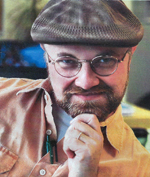By Eric George Tauber

SAN DIEGO–“Within every great man there’s a varied risk.”
“Enron imploded with breathtaking speed in the early 2000s, going virtually overnight from being the nation’s seventh-largest company to a bankrupt shell synonymous with corporate greed and deceit.” (TIME, Top 10 crooked CEOs)
We all know the name Enron and know that it has something to do with a great financial debacle. But how many of us really know what happened? My guess is not that many, including the many former Enron employees whose misplaced trust in their bosses ruined their lives. This is the story that Lucy Prebble translated into theatre and which Moxie is giving its West Coast Premiere.
Enron was a very prosperous power company based in Houston, Texas. With their president retiring, the crown was up for grabs. Longtime executive Claudia Roe wanted to stick to what they were good at: building power plants and providing the juice, opening up the markets in places like India and Africa. Jeff Skilling, however, had a more innovative idea: Mark to Market, which allows one to project future profits and enjoy them today before anyone has actually created anything. Skilling got the job. His vision also included hiring the brightest young minds straight out of Harvard and having them come up with “the next big thing.” Such fresh, creative geniuses -he reasoned- would not be hindered by the skepticism of experience. It seemed like a bold and innovative plan … until it didn’t work.
Trading intangible money can only get you so far. So, to keep their company listed as a “strong buy” on the stock market, their CFO, ANdy Fastow created a shadow company, LGM to absorb their debt. LGM didn’t actually “do” anything, but legally, it didn’t have to. All they had to do was convince investors to toss LGM a few million if they wanted to get onboard the Enron bandwagon.
But how do you make payroll when you’re not making actual money? Let them eat stock. Suddenly everyone, from the top dogs to the security guards were investing in Enron. Their shares were their retirement funds. Their investments gave them a sense of ownership and would put their kids through college … they thought.
“The company filed for Chapter 11 on December 2, 2001 — at that point the largest bankruptcy in U.S. history.” (Ibid)
But you can read the details in a business magazine.
What makes this great storytelling is the creative employment of theatrical devices. A Greek chorus was played by James P. Darvas, John Evans, Jo Anne Glover, Alexander Guzman, Robert Kirk, Sandra Ruiz and Savvy Scoppeletti. They came in and out of the action, transforming into employees, reporters, stock analysts and Wall Street traders. This group had great chemistry, singing stock sheets and keeping the action fast-paced and exciting. With apt metaphors, the Board of Shareholders were three blind mice with gray suits and white canes. The Lehman Brothers spoke in chorus as Tweedle-Dum and Tweedle-Dee.
Morgan Marvin’s multi-media projections appeared and danced on the walls throughout. The projections of Skinner’s young daughter, played by a cherubic Emily Thorn, were greatly washed out giving her a faraway, ethereal quality. That’s how it is when you put career before family.
But my favorite were the Raptors, monsters with reptilian heads and glowing red eyes created by Emily Smith. Their job was to “eat” Enron’s debt. Modeled after the feathered dinosaurs of China, the Raptors’ had shredded documents for plumage and the sound of their eery hisses foretold impending doom.
Max Macke gave a multi-layered performance as the tragic “hero”, Skinner. We watch his transformations from ambitious nerd to arrogant tyrant to captain of a sinking ship. We don’t exactly feel sorry for him, but we feel his desperation as he pulls us through his journey.
Lisel Gorell-Getz was compelling Claudia. She’s cold, manipulative, and not very likable. However, she’s also clear-eyed and right.
Eddie Yaroch was cunning as the master of “creative numbers” Fastow. His affection for his Raptors was creepy as he stroked their muzzles. A consummate opportunist, he would testify against his own mother to save his skin.
Mark C. Petrich was charming as Ken Lay, the man who made things happen in Washington such as electricity deregulation and getting “Junior” into the Oval Office. The son of a preacher, he prayed for guidance, but skipped over rules on ethics. His official cause of death was “heart failure” as he faced a forty-five year prison sentence.
According to the Sages, the first question we will be asked by the One True Judge is whether or not we were honest in our business. Time at “Club Fed” may be the least of the worries.
Enron is a historical tragedy akin to Julius Caesar and Richard III, a cautionary tale about what depths we will sink to for money and power and what lies we will tell to cover up our failures. If you want to hear a compelling story brilliantly told, then come to the Moxie Theatre by Dec 7th. The business magazines will never read the same.
*
Tauber is a freelance writer specializing in coverage of the arts. He may be contacted via eric.tauber@sdjewishworld.com